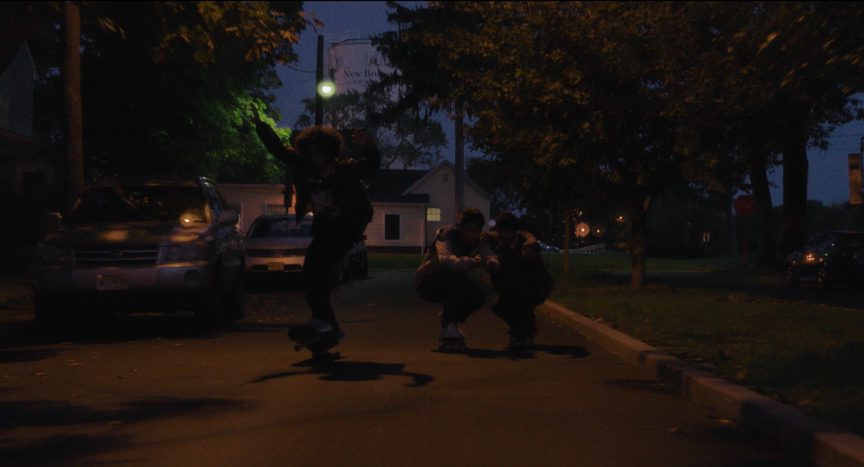In Kevin Tran’s feature debut, The Dark End of the Street, he ostensibly tells the story of a pet killer wreaking havoc in a suburb. Really though, the plot of the film almost doesn’t matter because Tran’s focus is much more human. Rather than building toward a climactic moment, Tran’s story floods out sideways, showing the different ways the characters in his ensemble cast—all of whom live on the titular street—react to the pet murders over the course of a single night.
That ensemble cast is one of many similarities between The Dark End of the Street and the series defining Twilight Zone episode, “The Monsters are Due on Maple Street.” Both highlight the disconnection of neighbors as well. Despite having lived across the street for years, Ian (Anthony Chisholm) and Marney (Brooke Bloom) have rarely spoken before he comes over to comfort her after her cat is murdered. Other neighbors barely know one another, and also like in “The Monsters are Due on Maple Street,” this lack of familiarity quickly transforms into paranoia when the news gets around.
RELATED: TV Terror: Scariest Episodes of Horror Anthology Shows
Probably the most interesting part of the film is the way Tran takes time to paint all of the different types of paranoia. Ian tells Marney, “It was probably one of those sicko kids.” Richard (Jim Parrack) has a different take, contending that what’s happening must be part of some kind of ritual because his friend’s dog “was defiled… [they] cut it from its nuts to its neck, turned it inside out like a sock.”

Richard has more to say on just about every topic as well, delivering many of The Dark End of the Street’s philosophical lines. In the car, he points out, “The burger flipper and the Nobel Laureate both sit down to s***. They’re going to die, the same way.” The pet murderer takes a backseat to Tran’s exploration of what it truly means to live in a suburb from a philosophical vantage. In that same car ride, Richard debates whether living in a suburb or a city really makes any difference, because, “Reality is what happened.”
Tran’s script cuts its deepest in an exchange between Keith (Daniel K. Isaac) and Sue (Jennifer Kim). The married couple sits across the dinner table, discussing the pet killer. Sue says, “Can we change the subject please?” Keith answers, “Honey, that wouldn’t make things more safe.” It’s the closest Tran comes to addressing how White Flight created the modern suburb. He entirely neglects to address another formative element in the creation of suburbs: redlining. While not every film is responsible for addressing every social ill, it would be fascinating to see Tran’s introspective approach consider the historical context of his subjects.

The large cast additionally allows Tran to alternate between the different residents of the street and mine their deepest anxieties. He does a good job bringing in actors of different ages and races. This range of characters make the film’s philosophical explorations more rewarding. His attention to these characters, his love for them, gives The Dark End of the Street its heart.
With that heart, this film has more in common with a poem than a novel (though it shares much with Shirley Jackson’s first novel, The Road Through the Wall). That attention to character and detail is beautiful, but the 70 minutes drags. Unlike “The Monsters are Due on Maple Street,” the conflict doesn’t boil over. Things happen at the end, but it doesn’t feel like the film was building toward them, or if it was, it did so in a roundabout way. It’s certainly not a satisfying ending, but the film never indicates that it was headed in that direction in the first place. Again, more poem than novel.
The cinematography in The Dark End of the Street lends itself more to the poetic as well. Sebastian Slayter helps the film navigate its micro-budget without losing visual value. When the cat dies, Slayter makes the admirable decision to film the cat’s felt mouse toy next to a pool of blood rather than showing the cat itself. He also includes a masterful shot later on, framing two characters’ necks rather than their eyes as they have a climactic conversation.
The music is sparse, and much of it is what the characters themselves are listening to or playing. A punk band practicing in a basement has the most fun. That song fits well, as does the soundtrack’s occasional piano.

The Dark End of the Street is a beautiful film. It’s paced glacially and ends without flourish, but what it lacks in tension, it makes up for with the close attention given to the characters and its suburban subject matter. It’s one of the few films that doesn’t completely condemn the burbs. I’m looking forward to seeing what Tran does next.
Wicked Rating – 6/10
Director: Kevin Tran
Writer: Kevin Tran
Stars: Scott Friend, Lindsay Burdge, Brooke Bloom, Jim Parrack, Michael Cyril Creighton, Jennifer Kim, Daniel K. Isaac, Anthony Chisholm, and Rod Luzzi
Release Date: August 11, 2020 (VOD)
Language: English
Runtime: 69 minutes

